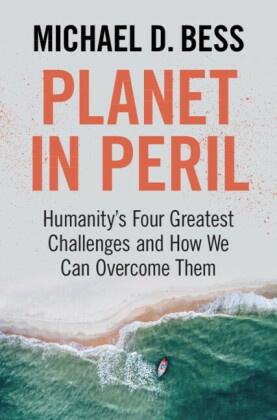Planet in Peril - Humanity's Four Greatest Challenges and How We Can Overcome Them
| Verlag | Cambridge University Press |
| Auflage | 2022 |
| Seiten | 452 |
| Format | 15,8 x 3,0 x 23,5 cm |
| Gewicht | 790 g |
| Artikeltyp | Englisches Buch |
| EAN | 9781009160339 |
| Bestell-Nr | 00916033UA |
Exploration of the top four mega-dangers facing humankind and plots a hopeful path to dealing with them through global governance.
Written by an award-winning historian of science and technology, Planet in Peril describes the top four mega-dangers facing humankind - climate change, nukes, pandemics, and artificial intelligence. It outlines the solutions that have been tried, and analyzes why they have thus far fallen short. These four existential dangers present a special kind of challenge that urgently requires planet-level responses, yet today's international institutions have so far failed to meet this need. The book lays out a realistic pathway for gradually modifying the United Nations over the coming century so that it can become more effective at coordinating global solutions to humanity's problems. Neither optimistic nor pessimistic, but pragmatic and constructive, the book explores how to move past ideological polarization and global political fragmentation. Unafraid to take intellectual risks, Planet in Peril sketches a plausible roadmap toward a safer, more democratic future for us all.
Inhaltsverzeichnis:
1. Introduction; Part I. Existential Threats: The Four Most Pressing Dangers Facing Humankind: 2. Fossil fuels and climate change; 3. Nukes for war and peacetime; 4. Pandemics, natural or bioengineered; 5. Artificial intelligence: extreme reward and risk; Part II. Strategies and Obstacles: The Solutions We Need, and What's Preventing them from Being Realized: 6. How to beat climate change; 7. Wise governance for nukes and pandemics: where to go faster and where to slow down; 8. Controlling things vs. controlling agents: the challenge of high-level AI 160; 9. The international dimension: where every solution stumbles; Prologue to Parts III, IV, and V: Does history have a direction? Hegel, Smith, Darwin; Part III. Sensible Steps for Today's World: Powerful Measures we Can Implement Right Away: 10. Do it now: five points of leverage; 11. Constructive moves on the international front for the next 25 years; 12. Breaking the political logjam; 13. Lessons from the green movement: how to build lasting change in the absence of full consensus; Part IV. The Middle-Term Goal: New International Tools for the Late 21st Century: 14. A promising track record: the dramatic growth of international institutions and networks since 1900; 15. How to escape the sovereignty trap: lessons and limitations of the EU Model; 16. Taking the UN up a notch: planet-level solutions for the year 2100; 17. The other path to 2100: ruthless competition, fingers crossed; Part V. The Long-Term Goal: Envisioning a Mature System of Global Governance for the 22nd Century: 18. Global government in a world of democracies and dictatorships: what it might look like in 2150; 19. Keeping the system accountable and fair; 20. Collective military security and economic sanctions: how to handle rogues, cheaters, and fanatics; 21. What could go wrong?; 22. Conclusion.
Rezension:
'The term 'existential threat' may be overused by those who explore global governance; but it undoubtedly describes climate change and pandemics, two of the four mega-dangers that preoccupy Michael Bess in Planet in Peril. It is hard to believe that international cooperation remains a tough sell in 2022. Imagine: global problems require global solutions! Bess spells out concrete, and hopefully doable, steps toward overcoming polarization and fragmentation. Let's hope he's right.' Thomas G. Weiss, CUNY Graduate Center

